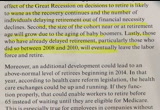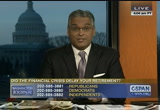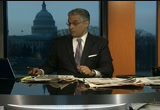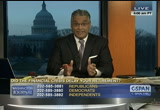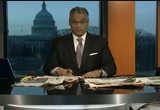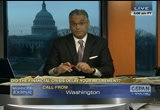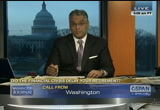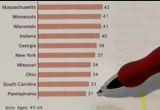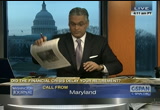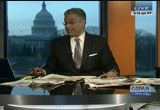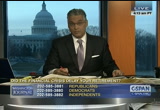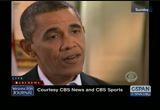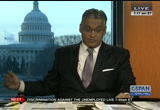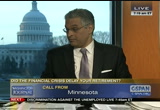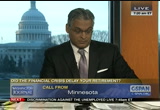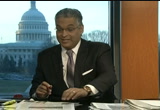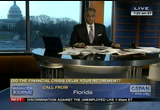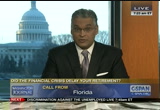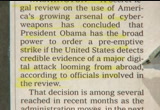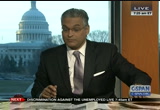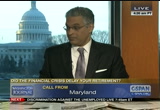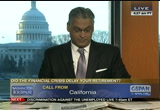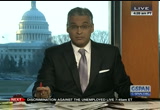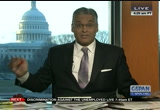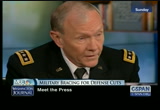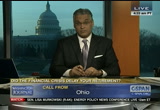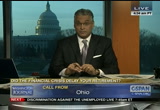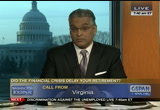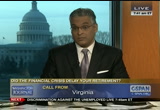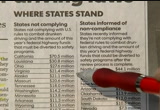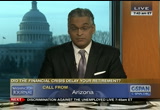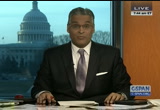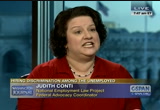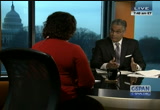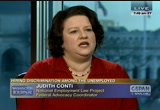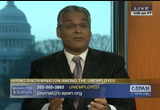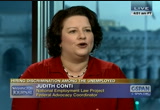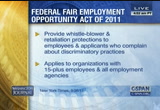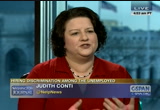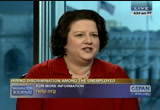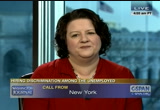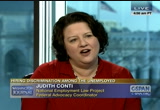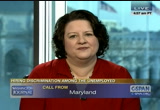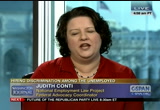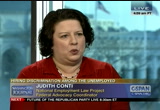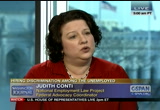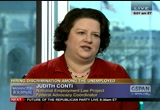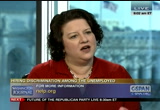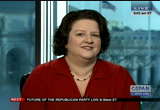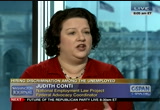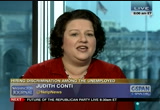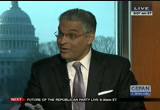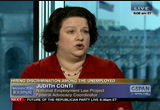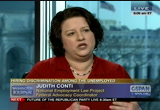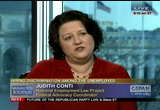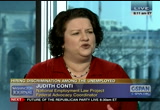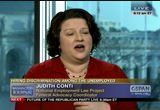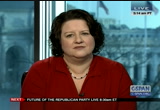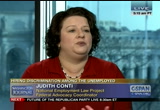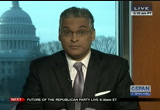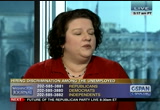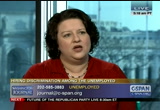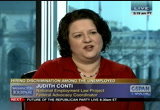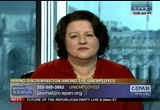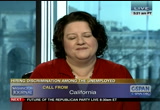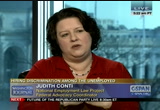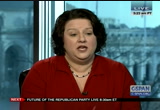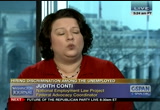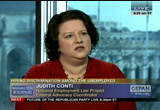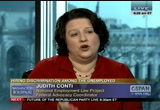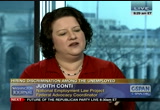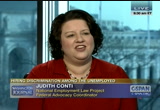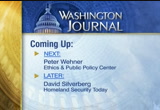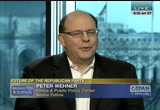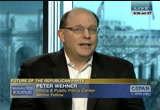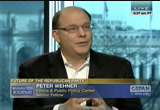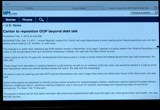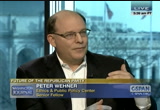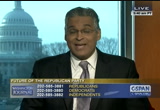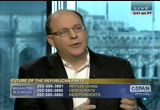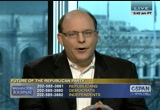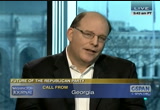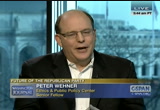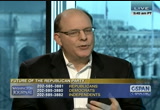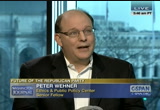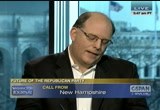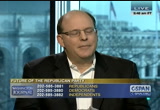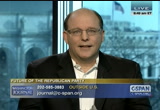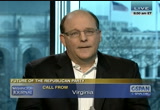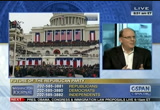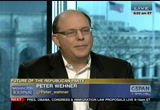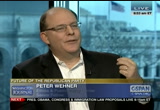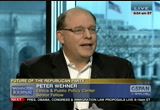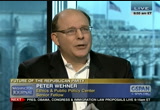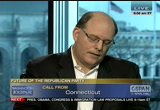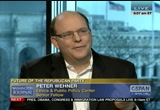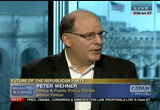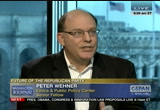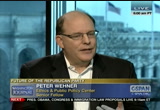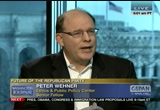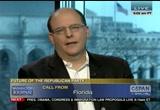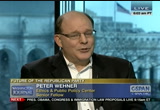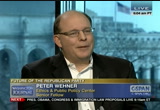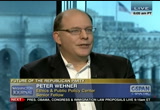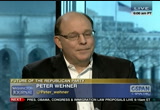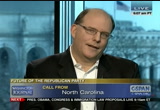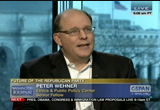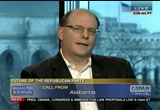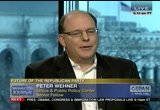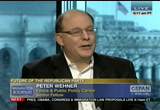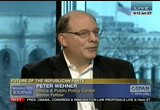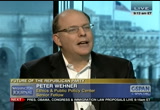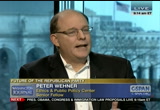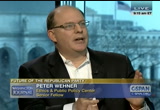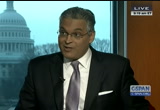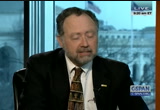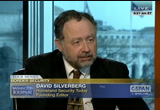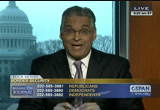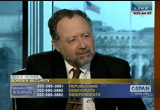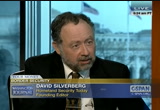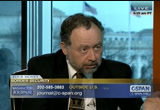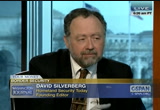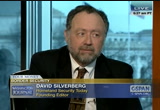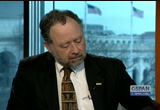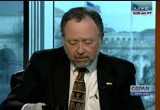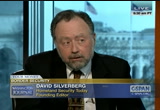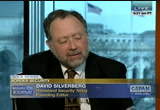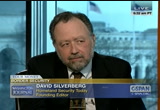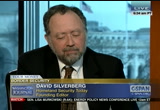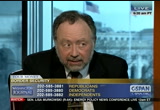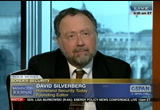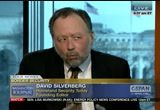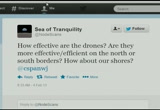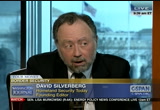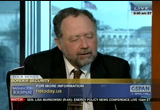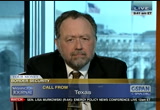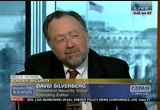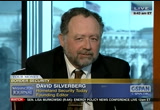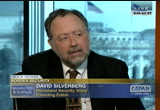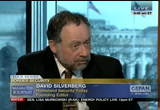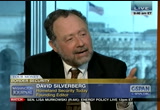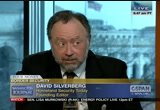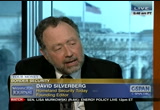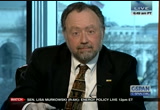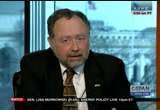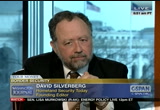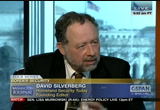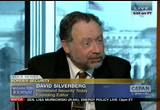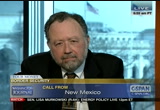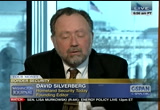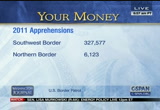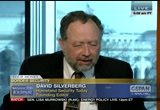tv Washington Journal CSPAN February 4, 2013 7:00am-10:00am EST
7:00 am
republican party and later, the editor of " homeland security today" talks about immigration laws and border patrol and technology. "washington journal" is next. ♪ host: congress returns today, part of the agenda includes consideration of a bill requiring the white house to produce a balanced budget. the story today from "the washington times" airlines readers that the budget act requires the president to put out a budget by the first monday of february. senator harry reid said the gun legislation in the senate will include magazine size and background checks, but it would not seek a ban on military-style assault weapons. an amendment could be included to cover that. the president heads to
7:01 am
minneapolis to discuss gun control. and the cost of the 2012 elections are in. the final price tag is estimated at $7 billion. according to the consumer confidence index, half the respondents said that the financial crisis went under the labour retirement plan. we are interested in hearing from you if the financial crisis delay your retirement. want to give us a call, the numbers are on your screen. for republicans, 202-585-3881. for democrats, 202-585-3880. for independents, 202-585-3882. if you want to reach out to us on social media, you can send us a tweet at twitter.com/c-spanwj. around 40 people so far responding on facebook. and you can send us an e-mail to journal@c-span.org. the survey that was mentioned talks a little bit about
7:02 am
respondents' and what they were asked about as far as their retirement plans and if the financial crisis be laid all of that. it says that respondents delaying retirement, nearly half of them planned to do so. this was done in 2010, but predicting the number retiring, it was important to consider three developments --
7:03 am
host: when they were asked as a result of the financial crisis if you are a household member planning to postpone retirement. in the first 45 minutes this morning from you, we want to hear about your retirement plans and of the financial crisis delayed that. tell us yes, no, and if you could, how those plans changed. the numbers are on your screen. for republicans, 202-585-3881. for democrats, 202-585-3880. for independents, 202-585-3882. you can send us tweets at twitter.com/c-spanwj, facebook at facebook.com/c-span, and e- mail as well. a couple of facebook respondents, this is from fred --
7:04 am
host: so, when it comes to your retirement plans, have things changed when it comes to your retirement plans? allen joins us on first up, our independent line. good morning. caller: good morning. thank you for c-span. host: go ahead. have your plans change? caller: a lot. i have been in limbo, unemployed for about eight months now. but it to best way to a budget -- a balanced budget would be reinstating the tax on wall street transactions. there are quadrillions of dollars in turnover and a 1% tax would generate trillions of dollars in revenue. host: talk about your retirement strategy a little bit. host: there is not -- caller: there is none. that is the point.
7:05 am
average people are in the same kind of predicament, not knowing what -- what do they call it? they want to have stability and predictability. where is it? host: when it comes to yourself, have you put anything away? caller: ipad, but it is all gone now. i would like to see a national infrastructure project. we could put people to work. host: steve from twitter -- host: next we're going to charlie. mississippi, independent line. caller: good morning. i am from jackson, where the capital is. i retired in 2009. it is a good thing. i was a civil servant. now in the state house there is legislation where some young
7:06 am
republicans want to phase out our state retirement program for civil servants. house bill 486 allows people to just elect, if they want to contribute to like a personal retirement system instead of state retirement. host: as far as your personal plan, is that grandfathered by these proposals from the legislature? caller: most of the bill has been in committee. they grandfathered me in because they have retired -- because i have retired. the same thing will for the retirement system, it will bleed people also. host: you do not have to mention specifics, but do you receive a monthly benefit, then? >> it is -- caller: it is about $1,300. i have saved up about $30,000.
7:07 am
i am set up, in a way. host: are you going to take social security? have you? caller: i am 58, it will be awhile. host: what did you do for the government? caller: i was a librarian. host: that is charlie, calling us from mississippi. you can choose the line that best represents you and tell us about your retirement plan and of the financial crisis delayed or change those for you. this is from twitter -- host: sandy, washington, democratic line. caller: how are you? host: well, thank you. caller: i was just going to say, not because he wanted to, but i had retired, if you want to call at that. i was more of a housemother because my daughter had cancer and i quit working and took care of the kids for a while as she
7:08 am
went through the chemo and radiation. i played housemother for a while. sam has always been a decent mechanic of heavy equipment. he had a foreman's job here in washington. he really quite loved his job. and then they sold the dealership to a company out of california and he worked there for another four years, and two years prior to when he could retire and collect social security they laid him off because of the financial crash, i guess that is what you would want to college. it put us in a real bind for a little -- what to call it. it put us in a real bind for a little while. he waited. host: because you live on social
7:09 am
security, how much of your day to day life is affected? how? caller: there have been times in our life when we have worried a little bit about money, we have never been -- middle-class is what i always considered we were, but you deal with it every day. now it is worse, because you are on this fixed income and really do not have -- we do not have a huge safety net, i guess is what you would call it. we had some savings, some 401k. it is a worry. every day it is what you pay first and you have a daughter struggling with medical issues and you try to help, you know what i mean? it has been very hard. host: that was sandy from kings, washington. again, you could join us of a phone to discuss your financial
7:10 am
plans -- your retirement plans and the financial crisis. for democrats, 202-585-3880. for republicans, 202-585-3881. for independents, 202-585-3882. it was interesting to note that when -- at our last caller from what -- at our last caller was from washington, it -- that our last caller was from washington. washington came in first, state- by-state, 56% of the respondents from that state said that they delayed plans because of a crisis, followed by arizona, michigan, colorado, and florida rounding out the top. at the bottom of the list, some of those states would include new york, missouri, ohio, south carolina, and pennsylvania. this was from the conference board of the consumer confidence survey. asking people about their retirement plans because of the
7:11 am
economy and financial crisis, that is what we are asking about you this morning, if the financial crisis has delayed those plants for you. give us a call. robert, clinton, md., you are on, sir. caller: 401k, in the early part of november my three kids were named the beneficiaries. we did all the paperwork. here it is, since february 4, and i have not got the money yet. the company that has the 401k, first of all, you cannot find them. i work in the credit union. they would not give you any information about the company that had the 401k. here it is, the fourth, and they still have not got the money.
7:12 am
you have got to wait a long time to get your money. host: tell us a little bit about your plans, because of the limbo you are in. what does that mean for you? caller how it means i have to be very careful about four hope -- 401k. if something happened to me, i would release the money to my kids or something like that. if they needed it right away, they could get it, but they still have not received the money. i still do not know how these things work. because of the interest, i do not know. thank you very much. host: jacksonville, ark., good morning. caller: how are you? caller -- host: fine, go ahead. caller: in 2008, when the financial crisis started, i was
7:13 am
working at a job on the pipeline, i was investing my 401k and everything. the crash, no one was able to build anything, so everyone in this shop had lost their job. the plant had closed. i had to live on my 401k until i could find a job. and then i got sick and wound up having to live on it. with all of that going on, i lost my house, my family. the financial crisis took everything. now i am left living on what little disability i guess and, you know, the people up there in the banks and everything that ended up getting all that money, they did not do nothing as far as helping the people that lost their homes, do know? i was working every day, paying
7:14 am
for -- their homes, you know? i was working every day, paying for a home. it wiped a lot of people out and there was never any restitution for nobody. host: you have a message for washington? caller: i have no idea. i just live my life, day-to- day, doing what i have to do. sometimes i have to sacrifice medication, or food, sometimes it is a constant fight. if i had had my job i would have had the insurance to take care of my injuries and stuff like that, it just wiped me out. host: this is liz from twitter -- new host: you may have watched the super bowl yesterday. during it, cbs news and cbs
7:15 am
sports conducted an interview with the president on a number of topics, including part of the conversation turning to the economy. [video clip] >> you think there is going to have to be additional revenue? >> there is no doubt that we need additional revenue coupled with smarter spending reductions to bring down the deficit. we can do it in a gradual way so that there is less of an impact. these deductions that certain folks can take advantage of, the average person cannot. not everyone has access to cayman island accounts, the average person does not have access to carry interest income, where they wind up paying a much lower rate on the billions that they earned. we want to make sure that the whole system is fair and transparent and that we are reducing our deficit in a way that does not hamper growth and reduce the kinds of strategies
7:16 am
that we need in order to make sure that we are creating a strong middle-class. host: jim from south carolina, on the republican line, good morning. caller: how are you? host: well, thank you. caller: you keep mentioning and hearing people talking about pensions, but pensions are just invested the same way that 401k is. stocks and bonds. people with pensions lost money as well. i heard cases where people were not going to get as much money. if someone is manages their 401k, i do not know, it needs to be managed properly and prudently. but not all things had to be bailed out. many people who went wild and crazy in real-estate got greedy, and we bailed them out.
7:17 am
it is not just one-sided, where the banks were the only villain. let's face it, we got crazy in the technology world and the real-estate world. people are still walking away from loans. mr. obama who you had on a moment ago, he gave cover for the gaping holes in the banking system. every 40 or 50 years, real- estate does this. it creates problems and is a drag. i hope that somehow we are able to get through this. thankfully, the best technological invention ever made is the mute button. you use it when the president comes on tv. it is so nice. host: a couple of stories from "arizona republic." talking about remaining allusive, according to the
7:18 am
7:19 am
7:20 am
retire or not. social security assistance goes right into social security after that. i have two plans, pension plans. my husband died when he was 66 and he had a pension plan. he did not draw any social security. he did not draw any of his pension plan. i have the ability to draw both. my pension, his pension, and social security. that makes a difference as to whether you can retire or not. i retired because of health issues. i think, when they start talking about the private sector doing the same as the unions, it is not going to make a difference. it is not going to be able to do that.
7:21 am
to my knowledge, the private sector never has a plan. what happens with a union pension is that the workers come behind you and put money in the pension plan for them. we put money in the pension plan for us. they do it for them. 401k and private pension plans do not have that. host: that is patricia. this is jordan, from facebook -- host: again, our conversation for the next 20 minutes or so, the financial crisis. if you can give us a call, do so using the numbers on our screen.
7:22 am
for republicans, 202-585-3881. for democrats, 202-585-3880. for independents, 202-585-3882. robert, fort walton beach, florida. hi. caller: the man from south carolina was spot on, we cannot rely on the 401 k. they were just like regular stock markets. the trick is you do not have to have a mortgage going into retirement. you do not need to wait for 10 years until you retire to start saving for retirement. social security is just going to be a supplement. do not have much, do not have a mortgage. take-out the annuity, i will not let uncle sam tax me to death. i will buy some low-end real- estate that you can rent.
7:23 am
if you're smart, you can keep it under the radar. host: what did you do? before you retire? -- retired? caller: i was in the swimming pool game. with those bad habits, they will take a lot of your money. -- quit those bad habits, they will take a lot of your money. host: you have other ways of supplementing? caller: i still have my 401k and a little bit from the pool co., but you live on what you have got and i will take my social security at 62. i have 5 cents. i was able to travel, but you sit there thinking the you can retire the older you get an travel and travel. i enjoy where i am at. host: if current conditions exist, will you be able to keep going for the near future?
7:24 am
caller: without a doubt. i will not let them tax me to death on the annuities. get the rental income off of that. host: here is twitter -- host: a couple of stories about technology. the lead story from "the new york times," taking a look at cyber security. the headline says that these broad powers include a secret legal review on america's growing arsenal of cyber weapons.
7:25 am
host: if you go to the pages of "the financial times," page 4 if you get the paper at home, writing about stronger cyber security measures coming by the end of the month -- host: virginia beach, good morning. joe, democratic line. caller: i did not postponed plans to retire. the reason i did not have to do
7:26 am
that is because i purchased a plan where if you put your money into that, roth, that is the only time the government can touch it. otherwise it is tax-free. but my concern is that even in the bank today the inflation alone begins to take your money in. you have to engage and participate. i think that all of us need to do if a little bit more. that is my comment. host: fred, independent line, maryland. caller: this is more of a question. the benefits of companies and their retirement packages, companies that come in, like ing, putting it on retirement packages, the people that go in
7:27 am
to sell it, they make a large percentage of those sales, that is how they make their income. i do not understand benefits for a worker when such a large amount of money is detracted from the to pay their sales goals. host: do you have a personal strategy when it comes to retirement? host: i have a 401k. i also invest in five specific stocks. everything is a long-term plan. host: another chris joins us, from san francisco, california. democratic line. caller: i was pretty much forced into retirement, lost my job in 2008 and i have been looking for full-time work since. college-educated, 20 years of
7:28 am
experience. i live in san francisco in an area where did score -- where discrimination based on age is encouraged. discrimination based on race is encouraged as well. it is a shame. my senators, basically if you are not from a protected class, you do not exist. these people -- i saved up a lot of money over my life and had planned on retiring at 65, like everyone else, but i spent a lot of my retirement just trying to survive, which is a shame. host: was your retirement 401k? personal savings? how did it break down? caller: it was a mix. host:-, n.c., joe is joining us
7:29 am
on the independent line. -- ash, n.c., joe is joining us on the independent line. caller: all of a sudden everything fell apart several years ago. i could have retired, but i saw the writing on the wall, businesses started falling down and everyone who has a retirement, god bless you, but it is so hard. i feel bad for the grandchildren who they all say are not going to make it. it is terrible, this country has put a hole in front of everything else. they have got to quit doing all this nonsense. host: the outgoing secretary of defense was on "meet the press," yesterday. according to the headline, "the first line from leon panetta, it
7:30 am
would be a shameful and irresponsible act for congress to allow the automated budget cuts known as sequestration to defect." -- to take affect." here is a bit of that conversation. [video clip] >> we have to plan for that possibility. so many members are saying that they would let it take place. why in god's name would members of congress elected by the american people take a step, badly damaging our national defense, undermining the support for our men and women in uniform. host: you said that this would be catastrophic, but it is not specific. sequester, are we going to be less safe? >> it is not just sequester. that is the piece that was missing in that discussion.
7:31 am
under a continuing resolution, the combined effects of sequester and the continuing resolution creates a magnitude of cuts in the last half of the year. we have to absorb $52 billion when you count the effects of sequestration and the continuing resolution. in the last half of the year, when some of that money is already committed and the only place you can go to get it under that circumstance is operations, maintenance, and training. by the way, the civilians that you hear talk about as being potentially furloughed, they will lose two days per pay period, 20% less pay for the rest of the year. the son of people living in washington, d.c. is this notion that it is probably ok because they are a bunch of white collar bureaucrats. the 86% affected are in our
7:32 am
7:33 am
host: euclid, ohio. good morning. has the financial crisis delay your retirement? allen, good morning. caller: my comment is that in the time that happened, i did not have a public pension. i worked in the city in ohio and if i did not have a public pension i think that would have been working for the rest of my life. an earlier caller mentioned pensions being affected, but when this crisis happened, you had to have some faith in the economic system. when you look at what happened during the depression, we came out of it. i figured at that time that the country would eventually come out of it. where would we have been five years later?
7:34 am
nowhere. i have a tendency to side with the republicans, but at the same time i still think that some of those protections were warranted for people. into the system you get so many people on fox news, knocking down public pensions. the average person in ohio makes about $26,000 per year. all of that talk about locking down those pensions is just bad, really bad, they should stop it. host: what is your pension look like? tell us about it. caller: it is not a bad tension. they did change this, it has changed. you are able to retire at 55, but they changed it to 57. you need 25 years in the system to do that. most people will go for 30 years in ohio. i am at $49,000 per year, i am
7:35 am
looking at 5 were six more years at the age of 60 and i will be eligible for about $2,500 per month. not bad. host: what did you do? you may have mentioned it. host: building and electrical inspector. host: that is euclid, ohio, joining us on the line. we have been talking about retirement and the financial crisis and if the financial crisis the late your retirement. the conversation is on facebook and twitter as well. give us a call, for democrats, 202-585-3880. for republicans, 202-585-3881. for independents, 202-585-3882. story on the front page of many papers this morning, the shooting event that took place yesterday. the front page of "the new york times," goes such --
7:37 am
if you wanted to find out more about that, you could go to our website, the c-span website, specifically the book tv portion and find out his own thoughts. chris kyl, an author, from his previous appearance on c-span. on the front page of minneapolis -- on the front page of the paper from minneapolis, talking about gun control. neil king jr. said that the bill would likely seek to "limit the capacity of magazines and expand background checks to gun shows and private transactions, requiring better record keeping to keep guns out of the hands of those with mental illness." host: this first paragraph tells about a new plan.
7:38 am
a ban on weapons, according to a wreak -- and aid from harry reid. the president of the nra appeared on "fox news sunday," talking not only about the president's picture the surface recently shooting skeet, but gun-control matters. here is what he had to say. [video clip] >> it is the same thing from the campaign -- they cover the country with messages like obama is not going to take your guns, but now he is trying to take away your guns. have you looked at the feinstein bill? that is exactly what he has done. i think of what they will do is turn this universal check on the law-abiding into a universal registry of law-abiding people,
7:39 am
law abiding people do not want that. >> forgive me, sir, you take something that is here and say that it will go all the way over there. there is no indication. i can understand that you are saying that that is the threat, but nothing from the -- but nothing from the administration indicates that. >> obama care was not a tax until they needed to be a tax. >> that was the supreme court. host: weighing in on the conversation, the financial crisis, did it delay your retirement? on twitter you can participate as well. host: let's hear from sandra in virginia. hello. caller: i am the wife of a
7:40 am
retired pastor. he is not retired, we cannot retire. because when the crash happened, we received notice from our retirement fund that in order for them to serve everyone, they were going to cut everyone, so we got a cut from 2100 per month to 1600 per month. my husband has to continue working, even though he is well past the age for retirement. they are talking about moving it up. while pasturing is not a hard job, physically, it is still a matter of going to work everyday and it is definitely an emotionally draining jobs. even though he is called a part- time minister, there is no such thing as a part-time anything in pastoral ministry. when people call on you, you come, and that is just the way that it is.
7:41 am
now that the stock market is going up, we are going to restore the money to the retirement? no, we are still just out here, kind of left on our own to figure out how to do it. this has definitely affected our way of life. we cannot see our friend child in portland every few years, we cannot afford to fly out there with the cost of flying going through the roof. that has definitely had an affect on us. the money is supposedly all back up in the stock market, the peak in a -- yippy kai yay.
7:42 am
host of this story today from "usa today, -- host: this story today from "usa today," "$539 billion would have to be spent on highway safety improvements." host: they have a list of the states that are not complying. side bar to this story. california comes in first, with alaska and louisiana following. the list goes on from there. we can look at a little bit of it as we go to our next call,
7:43 am
colleen, ariz., bullhead city. caller: thank you for making time available for people to share their experiences and opinions. in 2007 my husband and i sold our home in california and purchased a condominium. we purchased it in 2007 and in 2008 we decided to sell it. the price had dropped from $313,000 down to a short sale of $187,000. so, we had put $113,000 down, plus closing costs. that money just evaporated. we had taken out a $200,000 loan would wells fargo, a mortgage.
7:44 am
our money just evaporated. fortunately, we had our old property that was paid for and we lived in that, but that had been a rental for 20 years. we have a home that is paid for, but we did lose about $120,000 that just evaporated. that was painful. host: aside from real estate, what other retirement strategies do you have? caller: we have had 401k, but we took the money out and put it in the mobile home. i am thankful that we did that, otherwise it would have evaporated as well. host: that is calling from bullhead city, ariz., on the democratic line. thank you all for calling in this morning. you can go to our facebook page, there is a bit of a conversation
7:45 am
going on as this conversation goes on. coming up next we will be talking to judy about efforts -- judith conti about efforts to ban hiring discrimination amongst the unemployed. and coming up later in the program, a speechwriter from the 2012 mid romney campaign. that as "washington journal" continues, after this. ♪ [video clip] >> you have some hotshot who just got his ph.d. in computer science getting offers from all over the world's -- all over the world. very competitive. >> congress could do a lot. you do not have to be efficient on your iphone or blackberry to understand the application of
7:46 am
technology and what makes it work and does not make it work. >> it is difficult to make investment decisions and expect a return when you have no way to predict the future. our difficulty right now is that there is no consistency with certainty for our policy decisions. >> the government's role in the consumer electronics show, tonight on "the communicators," on c-span 2. >> at age 65 she was the oldest first lady when her husband became president, but she never set foot in washington. her husband died one month after being inaugurated. meat and harrison in c-span is our original series, -- meet anna harrison in c-span's original series, "first lady's."
7:47 am
season one begins february 18 on c-span, c-span radio, and c- span.org. >> "washington journal" continues. host: joining us now at the c- span cable, judith conti, a federal advocacy coordinator. welcome. guest: thank you. host: discrimination for the unemployed, what is that? guest: a growing phenomenon from the last few years, this concept that you need to have a job when you want to get a job. we started noticing it with job announcements, saying things like only people currently employed will be considered for the job. we were so troubled by the few announcements that were brought to our attention, we and some reporters working on the story started digging deeper. reporters started talking with human-resources professionals
7:48 am
who said -- yes, our clients are telling us not to send people who are unemployed, or if they are they have to be very recently out of a job. we started looking at online job wanted ads over the course of about four weeks. there were prevalent phrases that were very explicit in their preference to not even look at the unemployed, or had code words and phrases that if you read between the lines it was clear they were not interested in the unemployed. this is by no means a scientific or exhaustive study. without looking that hard, we found hundreds of job announcements that raised the concern that these employers were not opened to the unemployed. host: legislation, what did the new york city council say? what did it do? guest: it would be illegal to
7:49 am
refuse to consider someone for a job solely because they are unemployed. it does not mandate that an employer must hire unemployed people. it does not even mandate that an employer must interview unemployed people. but what it does say is that the status of being unemployed in and of itself is not a disqualifying job characteristic. it is not something that an employer can use to say -- she is not working, put her aside. it requires employers to consider all qualified applicants on a fair basis. host: if a person thought that they were being discriminated against, how could they prove that? guest of the proof is important. people are going to need evidence. they will need the job ad with language that makes it somehow clear that the unemployed are not welcome. and they would need statements,
7:50 am
either from hiring professionals, people somewhere in the process. people have called us over the year to say that they had been working with a such and such temp company and they were getting ready to send me to the job and they realize the was -- when they realized they weren't -- when they realize the was unemployed. they would need hard and fast evidence to get anywhere with a claim. host: judith conti, joining us to talk about unemployment discrimination. if you want to give us a call, for democrats, 202-585-3880. for republicans, 202-585-3881. for independents, 202-585-3882. we have set aside a line for the unemployed. perhaps this is your situation, we want to get your story. 202-585-3883. also, if you are involved in the
7:51 am
hiring process in any way, and you call in on the line that we designated, a freak -- feel free to do that on the line designated. judith conti, why is it not reasonable for the employer to seek people with up-to-date skills? guest: making the assumption that people who have been unemployed do not have up-to- date skills -- many of the announcements we were seeing were for food servers, receptionists. not things where your skills get stale because of advances in technology. plenty of unemployed workers work in technological fields or fields where the technology continues to develop, keeping up with skills. most people who are true profession -- computer professionals love to be on the computer and learn the new thing. even if they are not working, and i have spoken to these workers, they are out there
7:52 am
learning new programs and new technology on their own, because that is just what they do. the way that i would read a book for pleasure in my down time, they will get on the computer to learn something new because that is what they enjoy doing. there is this assumption among some lawyers that skills are getting stale, but there is no looking at the resume or speaking with the otherwise qualified individual to see if that is actually true. host: something from the state level, this is from new york, the employment opportunity act of 2011, making it illegal for employers to discriminate against unemployed job applicants. unsuccessful job applicants could sue and required damages. host: where does this stand, as far as the bill is concerned? guest: this was introduced in the last section of congress --
7:53 am
last session of congress. we are working with those offices to introduce the bill again as soon as possible and i and good timing. it was something that president obama put into his american jobs back. this is the bill that has received a lot of attention and has had a lot of widespread commitment from members on the hill, as well as the white house, to make sure that we keep talking about this issue and combating this unfair practice. host: on the city level, this met resistance from mayor bloomberg? guest: mayor bloomberg announced that he was going to veto it. he was in particular worry that it would lead to frivolous lawsuits. there is this talking point out there amongst some that means that this means employers will not even interview unemployed people. i think that the employer would
7:54 am
be smart to interview unemployed people to show that they were not discriminating. i do not follow the logic. host: the bill says that if you have been unemployed for a period and to not get a job that you applied for, you could sue the employer arguing that they were discriminating against you. i cannot think of any rational employer that would not want to know what you're doing. guest: and it is ok for the employer to ask -- what have you been doing? why did you lose your job? what have you been doing since then? it is the same as the other bills that were passed or introduced in context in the last few years. a worker -- they were carefully crafted not to take away an employer's right to ask about gaps in employment. the concern that i think is really a smoke screen for something else. host: a special line for those of you who are unemployed, we
7:55 am
want to hear from hiring officials as well. this is steve, buffalo, democratic line. good morning. caller: this is a subject that has to do with the entire context in which you are talking about this occurring. it is in itself a capitalist system where the economy has become completely self referential. anything outside of it is not even considered. nature has become external. it has skewed man's view of a physical reality, meaning that you subject that cannot work infinitely of a finite planet with finite resources, especially water. in terms of employment, the capitalistic world is creating systems that do not need people. this is one of the major things that are never talked about. you have massive population growth of companies that will literally eliminate people.
7:56 am
they continually talk as if they are job creators, but they are not job creators, they are wealth creators. the job is just a means to an end. host: judith conti? guest: you make a lot of interesting points. particularly when you talk about the system being skewed, it is already skewed to the hardly employed. we have lost millions of jobs over the course of the recession. there are still 11 million people unemployed right now. if we are not out of the deficit that we lost. in terms of the system being skewed, if we are continually supporting a system where jobs go to the already employed and we are really not doing anything to foster the economic recovery that is going to benefit everyone in society, none of these laws and nothing that the national employment law project
7:57 am
is advocating for says you have to fill open jobs with unemployed people. what we are saying is that qualified unemployed people should be allowed to compete on terms that are fair. that is good for all of us in an economic recovery. host: baltimore, md., just retired, go ahead. caller: i would like to say one thing before i say my question. i love c-span and i always want to make it through on a phone call and i am glad that i made it through. that being said, and by the way -- go ravens, we won the super bowl. my question is this. i live in baltimore city. the unemployment rate in baltimore city is unbelievable. the problem that you have is that not only are so many people unemployed, but there is a lack of job opportunities. my question is -- how will the work that you are doing affect people who are living in urban america who are african-
7:58 am
americans, latino americans, asian americans, having a difficult time finding a job, but when they find that the job that they have is often not located in the city lived in, but located in the surrounding areas and because they are unemployed, they have a problem getting to the place. host: you said you were just employed. how long were you unemployed? caller: since august of 2012. i got hired for a position this week. i will be a dispatcher for an ambulance company in baltimore. $13 per hour. guest: so glad you got a job, that is great. my giants won the super bowl last year, i know how happy you are about the ravens. what you say is revealing. we need to be going at this on many fronts. this issue about trying to ban discrimination against the unemployed is one small part of
7:59 am
a bigger agenda. a number of publications have come out aimed specifically at things that states and local governments can do to create jobs, work on their own infrastructure, things like better transportation options and making sure that public servants can stay on the job. one surprise in market of job loss -- one thing that has stabilized itself is a public job loss. our allies in washington, d.c., are working on the recovery on many fronts. the thing we need to do that is not happening nearly enough are the discussions about the types of investments that we can make in direct job creation that can get people out there working and rebuilding our nation's infrastructure, greening our economy, making sure that civil servants, public safety
8:00 am
officers can stay on the job in sufficient numbers, that we support a robust economy and make sure that our economy -- society is protected. host: what happens to employers who discriminate in this way? guest: we have heard a number of some say there were flooded with so many resumes, that this made their job easier. i've been involved in a lot of hiring process is in my life. automatically, screening out people based on something like that strikes me as something that is lazy and a tactic that is not really designed to get you the best qualified people. that is a rationalization that i reject. others have said that's they assume if you were really that good a worker, you would either still have a job or you would have been reemployed very quickly. two things at play. there are people that don't
8:01 am
really understand the nature of just how bad this recession was, how many fully qualified stellar people were laid off and not only lost their jobs but could not find a job within the first six months. our economy was that bad. also, if i could play a amateur and cultural anthropologist for a moment, i think what we have seen are interesting psychological processes going on. so many people over the last few years with grade education and great skills know that their jobs and job security is fragile. as a way to almost protect yourself in a defense mechanism, people like to think that could never happen to me, i am good enough that i would not lose my job. or if i did, i would certainly be able to find something right away. in some ways, by turning on the
8:02 am
unemployed and putting this on them of if you are really bad good, you would not have been out of work all that long. i think it is a defense mechanism that makes people feel more secure about their own jobs in a fragile economy. ikea there are a lot of very complex factors going on here. but is rooted deeply in complete misunderstanding of just how bad this recession and house will be covering has been. host: if someone wants to find the best way to protect themselves, the questions are in the gaps in employment. guest: the important thing is to be honest, tough about why you lost your job, is it because the company went under, if there were massive layoffs, if the industry suffered? talk about all you done to try to get reemployed. employers don't want to hire lazy people. if so then you've not been sitting on applying for one of two jobs a week, which is not
8:03 am
what people are doing. people are actively out there looking. discuss the creative and intense efforts you've made to find a job. doug about what you have done in the meantime. there are many people out there continuing their training or education, volunteering in the community, perhaps taking on a new role in their family. -- talk about what you've done in the meantime. one person in a family had been the breadwinner and then lost his job and later became involved in the kit's school after he lost his job. talk about that and talk about how you made the best use of the time you have. host: arlington, virginia, ben, good morning. caller: good morning. thanks for taking our calls. i think you and i will disagree on this, but i would just send this out to the public and i'm interested in your comments. it seems to me that we've got
8:04 am
two sides in this equation. we have the potential employers and a potential employee. we allow a potential employee to make his decisions or whatever reason he wants, even if they are completely irrational. in other words, potential employee can say i don't want to go work for this guy because he has tried to start companies five times and has failed all five times, so i am concerned about this company, if i want to go work for ibm, which has been there 100 years. he can make that decision if he wants to. if we really believe this, we should have a free society, that we have to allow a employers to make three decisions, even if you or i or most of the public would say that is not a good way to do business, maybe you should consider if everybody even if they are unemployed. if some employers don't want to do that forever reason, i think that is their prerogative. host: in this country and, we
8:05 am
give employers tremendous providence in how to run their businesses. generally, when it comes to hiring and firing people, the rule of the nation is something called employment at will. it means an employer can literally fire anybody for good reason, a bad reason, or no reason. you will see court cases where the employer had a bad night, will, cranky, came in the next day and find somebody for no reason, discuss. that was upheld by a court because it was completely within the employer's products. courts are loath to second-guess employers for why they hire or fire people. there are laws that let the courts do that only in the narrowest of cases. we have civil-rights laws that prohibit firing, promoting and hiring based on race, age, national origin, religion, pregnancy, those immutable characteristics that we think are worthy of the protection of
8:06 am
our civil rights laws. in most states there are modest exemptions to the employment at will dadoctrine, amount wrongful discharge. when an employer requires someone to break the law in order to keep their job. or if an employer is doing something that is in violation of a well-defined written public policy. other than that, we give employers in this country wi de latitude, because we have a free market economy, because we recognize the person that takes the risk and set up a business and puts their monetary and human capital into it, that they have rights to run their business the way they see fit. we are very, very reluctant to place any sort of restrictions on that. again, this is a small one. not saying that you have to hire anybody that is not fully qualified for your job. in essence, what these laws do rainout are saving employers from themselves, because if they
8:07 am
are ignoring all of the unemployed workers out there in this still tough job market, they really could be missing the best qualified person for the jobs. host: on twitter -- guest: that's another place where there is discrimination against the unemployed. it's predominantly women, although not entirely. they quit their jobs to care for aging or ill relatives or young children before they get to school age. when we are discriminating against the unemployed, we are also putting up an additional barrier against women who have left the workforce for awhile for caretaking reasons and are trying to get back in. host: there was an op ed --
8:08 am
guest: i would make two responses. first, there is the federal law, the fair employment opportunity act. very explicitly this not enshrine the status of unemployed in the civil rights act. we did not have that rise to the level of the immutable protections that we have in the civil rights act. so there's a lot of talk about why this is not like race or sex discrimination. those of us athens lot project disagree. our differences and that's why they're handled differently. new york city and d.c. have been in shining their protections in their civil rights act, but there is have
8:09 am
very different qualities and characteristics. based on the type of jurisdictions they are. more liberal, more progressive jurisdictions. but beyond that, this is just something that is so important for our economic recovery, to make sure that we give people a fair chance. everybody raises this, but perhaps of rampant widespread litigation. i am not a statistician by profession, so i take what i'm going to say with that in mind. i spent some time friday looking at litigation and complaints statistics for around the federal civil rights act. yet the equal employment opportunity commission that accept charges of discrimination from people across the country with or without lawyers, often without lawyers. for the last few years there have been fairly consistently about 100,000 complaints of discrimination filed. that's across the entire country. this is an agency that has multiple offices in every single
8:10 am
state, the ability to file on line, by phone, and they work to make themselves accessible. this includes disability discrimination, pregnancy, age, race, national origin, religion, all the characteristics that are protected under our federal civil rights act. about 100,000 cases across the entire country. of those 100,000 cases in the same few years, approximately 18,000 cases have been brought to federal court. -- 14,000 cases. 14% of the charges end up going to court. it is showing plaintiffs' attorneys are screening carefully and not bringing cases unless they know that there is some evidence. the department of justice did a study of employment cases and employment litigation and civil litigation in general. in 2008 there released a report showing that of all of the
8:11 am
employment discrimination cases that are brought to the federal court, about 3% of them retrial. about 1% of them resulted in a verdict before the worker. i have spent time in the community of advocate. i have worked very closely with the associations of the plaintiffs' attorneys. these are small firms, small businesses, places that pride themselves on screening for the right kind of cases where the re really is evidence and where either a settlement or verdict in their party's faber will be fair, because of the economic realities of their practices. these threats of widespread lawsuits, i just think that it is a straw man. it's a great argument because everybody loves to raise the specter of a trial attorney. but in terms of the employment bar, these cases are
8:12 am
only brought forward when there really is evidence. as you can see from statistics, the deck is stacked against the plaintiff. host: we are talking about hiring discrimination against the unemployed with our guest judith conti. she's a federal advocacy coordinator. >> the national employment law project has been around 43 years. we are non-profit, non-partisan organization that advocates on behalf of low-wage and unemployed workers. we want to make sure that people who work for a living have a fair shot of rising up the ladder of economic opportunity and becoming part of the secure middle class. we advocate for the unemployed to make sure they have safety nets while looking for jobs, that there is adequate and appropriate job training for people who need new skills, we also work on behalf of low-wage workers to make sure the minimum wage is set at a fair and
8:13 am
competitive level, that the wage laws we have in this country are adequately enforced, especially on behalf of those low-wage workers. we look to protect people who have criminal records or perhaps poor credit histories from unfair job discrimination. certain people to not have certain jobs. you should only get jobs for which you are qualified. but there are unfair barriers in this country that we are working against. we work on bafta of emma brown workers and we will be very concerned to make sure they have adequate protections in whatever is done in terms of commons of immigration reform. we have a very wide array of topics that we work on. -- we work on behalf of the immigration workers. host: kevin is on the unemployed line. caller: i've been out of work four years. i retrained for medical records after my job in the commercial printing industry was offshored. i've been trying to get employment as a medical coder,.
8:14 am
i filed a complaint against one of the large hospital systems and was told it would likely go nowhere and all they could furnish me with was a right to sue letter. simultaneously, i filed a complaint with the civil rights center, because the local one- stop employment offices were not following up on my discrimination complaint against the hospital system. there is a lot working against the unemployed. i am finding people who are retrained for another field out of work long term, this is being held against us in addition to gender, age, disability. to your comment about the eeoc, i have to agree that you have a 1% shot of getting any resolution. host: the brunt of age. is this a factor in this process? guest: it is. among the long-term unemployed,
8:15 am
people out of work for more than six months, and all the studies show that is the turning point. if you don't find a job in the first six months, your chances of finding one's really are much harder after that. people who are the long-term unemployed are disproportionately people of color than and disproportionately older workers. in the recession and recovery, older workers have been somewhat less likely to be laid off. over the age of 50, i mean. once they're laid off, they're much more likely to be out of work for over six months. we see the sanding with people of color. -- we see the same thing with people of color. the caller did not discuss the details of why he was filing a discrimination complaint. it could be a myriad of reasons. but his race or his age might have something to do with it. he also talks about how we lost a job in an industry that is leaving the country, which is a
8:16 am
real shame. but he took the time to retrain, to find a job in the health-care industry, of which is a growing industry. but that was somehow held against him. i don't know his individual circumstances. but that is exactly what public officials and politicians at all of us are telling the unemployed to do. take a hard look at your situation, realize that your job is not coming back, that you have to learn something new. and that's what he did. if that is being held against him, where we are setting up all the wrong incentives for our recovery in this country. host: on our independent line in fort washington. caller: good morning. pedro, more frequently, could you display the numbers for republicans, democrats, and independents? my question would be this, how that actually imprprove you have been a victim of
8:17 am
discrimination? how do you establish that in a court of lost? second, on the discrimination side, would that also apply to undocumented workers as well? i will listen to your response. guest: how do you prove it? you need evidence. you cannot just say i am unemployed because i did not get an interview appeared therefore it must be discrimination. you have to have something from the job announcement perhaps that suggests they're not inclined to hire the unemployed. you have to have a statement from somebody that shows they were not inclined to hire the unemployed. host: could you ask the human resources director did i not get the job because i was unemployed? guest: you would get a little further by asking why did i not get the job?
8:18 am
ask an open-ended question, it could be that the answer shows something. i'm not saying it will be easy to prove these kind of cases. the fact of the matter is when we pass laws banning certain forms of discrimination, in some ways it does drive it underground and makes people try to hide it. at the same time, we have also learned over the course of the last two years as we have been talking about this issue, as nelp has been working steadily, locally, and statewide to support legislative efforts to ban the practice, that employers have started for reconsidering the practice. at one point it seemed to them logical and benign. when they started seeing what public opinion was about it, and they started thinking about it in more detail, they realized that there might be shortchanging themselves and and other workers. so the good of passing laws is not just provide people with a
8:19 am
legal remedy in a court or administrative agency but it is to make a statement that we as a society find this practice offensive, that this is not something we will tolerate, and that does starts a process of changing people's minds about , whichactice which i is very important. in new jersey and oregon what they've done is they've passed laws that ban ads that discriminate against the unemployed. they have not actually banned the practice itself, unfortunately. two states took action quickly, in response to a national trend they found offensive and they have put out public policy that this was wanted the district of columbia has gone further and ban the practice, giving people the ability to go to the d.c. office of human rights and file a complaint that could be investigated. new york city was the most
8:20 am
recent pe. it makes it illegal to's adds, makes it illegal to engage in the process, gives people the right to go to a civil rights office, and gives people the right to take it to court. host: we have set aside in line for those unemployed. now to napa valley, california, bridget. caller: an issue i have been dealing with over the last three and a half years to 4 years. i've been in the health-care industry about 22 years. four years ago i decided to a upbraid my skills, because it was an area of health care that was starting to increase in the area i live. -- upgrade my skills. i live in southern california. i'm not quite sure if she can help me with any statistics on
8:21 am
this area, but the jobs that i applied for now have been where you must be bilingual or use the phrase "we prefer you to be bilingual." all the of the skills are in place to do the job. but that is one problem i have faced for almost four years of trying to keep a job in the area of health care. there have been times i have gone to certain doctors' offices, even some hospitals, where the entire staff are hispanic and they tell you it is because we cater to a lot of people who do not speak english. host: thank you. guest: i appreciate that conundrum, because it is one that i share. unfortunately, i am not bilingual. in my field there are many jobs i cannot remotely compete for
8:22 am
because they primarily serve the latino population, people that if either don't speak english or don't speak it fluently. and the caller is from california pri is a reality in certain parts of the country that the populations are shifting and that if you want to work in certain fields, being able to communicate with people in multiple languages is becoming more and more of a truly legitimate and bona fide occupational qualification. that's the term we use. it does result in situations where all of a sudden you see a certain population becoming more likely to get jobs because they inherently have the skill. they have grown up in bilingual homes, they are bicultural. they understand the interplay of languages. i think it is something that a few generations of workers right now are sort of stuck in an untenable position, because we have not been brought up in an educational system that values the bilingual skills as much as we should.
8:23 am
hopefully, our children will do better and they will learn from early ages and not have those kind of barriers of finding work. i feel for the caller. if i really do understand your frustration. host: lancaster, pennsylvania, on the democratic line. caller: good morning. i have one question about being over 50. i am unemployed. what they say to you is you are overqualified. what do they mean by that? the other thing is jobs we see today are still being outsourced. as i speak, there are probably thousands and thousands of jobs being outsourced. host: thank you. guest: overqualified could mean one of two things. it could mean you are overqualified for the job. we hired three years ago for an administrative assistant position. something -- we wanted someone
8:24 am
to have a college education and could do not just typing and letters and all that sort of engaged in they could d substantive work we have as well as administrative work. but it was very clearly a job that was born to take someone in the mid 30's, was not going to be leading on a career path to someone who was going to run the organization sunday. we had over two under and applicants. if there were people with the '80s, people with mbas, law degrees f, people who in practice law or been in the workforce 20 years or 30 years, very significant. we were in the worst of the recession at that time and any job was better than no job. if we did not screen them out because they were unemployed. if we did screen them out because it was a job that they were vastly overqualified for, clearly not what they wanted, and if something that if they got something better comes
8:25 am
along, they probably would move on. but they would be frustrated doing it in the first place. our economy does not work well when highly qualified to, of educated people do jobs that is severely benita the capacity they have. host: ultimately they would go to a job in their field. guest: exactly. there are times when people truly are overqualified and are not prepared for that job. because we know they want something better. on the other hand, overqualified could be a buzzword, a code word for age discrimination. but you need more than just you qualified for the job to make a case. are you clearly overqualified from your resume? i knew a gentleman who had a 30 year career in the federal government and a ph.d. in sciences who was out of work two years and so desperate for money that he applied and local supermarkets and gas stations and this and he was
8:26 am
overqualified. if he had a high-school degree and they said he was overqualified, then that might be pretexts and we would need to look the context of the situation as well. outsourcing is still happening. i am beginning to hear more and more politicians who have been very pro-free trade and pro- opening up the borders to free trade now realizing that perhaps the promise of a vibrant export system for american workers has not really yielded the results that we thought it would. and maybe it's time to renew our thinking. but that is a much bigger discussion for another day and a different expert than i. host: mark is calling on our unemployment line from new jersey. caller: morning. i was previously a software engineer to the end of 2008 when i was laid off along with
8:27 am
hundreds of other people company. i have been unemployed over four years now. i've tried every thing. i've kept my skills absolutely up to date and have demonstrated that online. recruiters call me because they love my resume. so i talk with them and they have me do an online test of my skills. then they get back to me and say your skills are great, you are perfect for this job, so then i go on a face-to-face interview and i am well groomed, articulate, intelligent, ready and knowledgeable about the the employer i am applying for jobless, never hear from them again. oldabout to be 59 years next month. like i said, i applied with supermarkets, drugstores, retail establishments. i have 15 years also as a
8:28 am
salesperson. i have applied it with all of the national chains. i don't have the background or qualifications, in e-mail, they tell me. i've worked in sales 15 years. there's just no hope for someone of my age. i'm about to live in my car now because of this. guest: it is a heartbreaking story. this caller is like so many that we hear from day in and day out at the national employment law project and our allies across the country serving the unemployed. this guy has done everything right. he's got education, kept up with this training, is a hard worker. if you heard him talking about being well groomed and recruiters loving. if he probably has problems with age discrimination and bias against the unemployed working against him.
8:29 am
it's a very competitive job market as well. as exceptional a candidate as he is, there are probably dozens of people acceptable candidates. we're not trying to say banning discrimination against the unemployed will solve all the problems can be the key to our economic recovery. it is but one little part of a big puzzle that we need to work on. all i can say to mark is i'm so sorry. we are a country with vast resources and vast wealth in spite of the recession readjust gone through. situations like. host: only a few states actually weighing in on this legislation, duke think there will be a considerable change? guest: i think they're already has been a considerable change in the quarter public opinion. when you read an article on line about over the last couple years, the phenomenon of discrimination against the unemployed, when you read the comments, if 90% of them are from people who are outraged,
8:30 am
who are articulate and sensible talking about the unemployed people. they know this would be unfair to discriminate against them. i think it really resonates with people. i think as employers read the public opinion, especially larger employers, h.r. departments and legal departments follow these trends. when they realize if this is something the public does not like and forgets out that your company is engaging in this kind of practice, is going to hurt the company in public opinion. so i think already the fact that president obama has spoken about this, but agreed members of congress have spoken about this and have been pushing this law, but across the country there are other states that have tried and not succeeded yet, but they will keep trying again. just the publicity around it already is starting to. make a to host: here's one more call. bob in fayetteville, north carolina, republican line. caller: i would like to talk
8:31 am
about the practices at the fort. with veterans that are supposed to being hired, to have preference, i just retired, but we would have females and there's a lot of reverse racism. it would be females hired and have no veterans preference at all. i know a lot of guys where females were put in for the jobs and they would not get the jobs and all of a sudden the females -- or mails would be brought into these positions and have no veterans preference. -- males. it is reverse racism. guest: i obviously cannot comment on the merits of what is going on in fort bragg. i will say this. we as a country have laws about
8:32 am
gender discrimination, race, age discrimination. laws about fair wages that repay people and when they are entitled to overtime. the fact of the matter is, all of those have been enacted for very important societal reasons. it's up to our administrative agencies, our courts on the federal and state level to vigorously enforce those laws, because that is when we all prosper most. host: judith conti with the national employment law project , their federal advocacy incorporator. nelp.org is their web site. thank you. guest: it was a pleasure. host: coming up, we will talk about the future of the republican party with peter weiner, the senior adviser and speechwriter for the romney 2012 campaign. later on, efforts to strengthen and modernize or security. our conversation with david silverberg will take place later. first, a news update from c-span
8:33 am
radio. >> its dave clarke 32 eastern. president obama traveled to minneapolis today to talk about his anti-gun violence agenda. the president will meet with members of the law-enforcement community on his plan to ban assault weapons and require universal background checks for gun buyers. his visit to the minneapolis police department poses special operations center marks the first time the president is campaigning on his proposal outside washington. c-span is covering the president's remarks. you can hear him after 2:30 p.m. on c-span radio. the new secretary of state john kerry introduces himself agency employees after spending much of the weekend making connections with leaders from around the world. if he reached out to israeli and palestinian leaders in phone calls yesterday and assured them the obama administration will continue to pursue a mideast peace agreement. he also spoke with his counterparts in japan, south korea, turkey, canada, and mexico if. he had lunch with george
8:34 am
shultz, secretary of state under president ronald reagan. kerry was sworn in friday by the supreme court justice elena kagan, succeeding hillary clinton in the president's cabinet. former new york mayor ed koch passed away on the weekend and is being laid to rest this morning. he will be honored by former president bill clinton. the israeli consul general is also upset to speak along with new york mayor michael bloomberg. c-span is covering this service. you can hear it later in our programming schedule. those are some of the latest headlines on c-span radio. >> if you have a hot shot that just got his ph.d. in computer science from stanford, she is getting offers from all over the world you can stay in limbo six years. it is competitive. >> congress can do a lot. you don't have to be efficient on your iphone or blackberry to understand the applications and technology policy and what makes
8:35 am
it work or not. >> it is very difficult to make investment decisions and expect any kind of return on investment when you have no way to predict the future. our difficulty right now is there's no consistency or certainty in our policy decisions. >> the government's role in technology and policy from this year's consumer electronics show. tonight on the communicator's at 8:00 eastern on c-span2. washington journal continues. host: our guest serves as a senior fellow for the ethics and policy center, but was the senior advisor and speechwriter for the 2012 romney for president campaign. welcome. guest: thanks for having me. host: where has the republican party and been headed since the election in november? guest: in a bad direction in general. the republican party lost the election in 2012 and they should not have.
8:36 am
this was set up to be an election where romney should have won. the economy, the majority of americans thought the economy was in recession. economy was weak from beginning to end. the main programs that president obama had were vastly unpopular. obamacare and the stimulus package. republicans had come off the 2010 midterm election and had an epic victory and were thought to be enthusiastic. it's not just that mitt romney lost but then he lost by a substantial margin. republicans lost two senate seats when a lot of people thought they could regain control of the senate. they lost eight house seats. it was a very bad election and a warning sign for the republican party. since then, republicans have been wandering around and try to get their feet under them. there's a realization the partisan trouble and people are not quite sure what needs to be done about it.
8:37 am
that is good in a sense that i think now is left 1000 flowers bloom. a lot of people need to offer some alternatives about what needs to be done. host: what is your chief concern? guest: right now the republican party is on a losing track, partly because of demographics. in the last 20 years, from 1992 through 2012, republicans lost 4/6 elections and the popular vote. they have been defeated sadly in many of those elections. came after 20 years when republicans dominated on the presidential level, 5 out of 6. republicans are not reaching middle class voters. the voting group that tends to vote democratic is enlarging. the republican party is not figured out a way to appeal to
8:38 am
those voters. want to use as the republican party lost, but this was an anomaly. that the 2010 election showed how much potential the republican party could have. there was marco rubio. and then there's a second school that says that these are really more systematic problems that the republican party faces, in large measure because of demographics. i am of that can. if the party is going to win presidential elections, it needs to address those systematic problems. host: a story today says house majority leader eric cantor will urge republicans to stop fussing about federal spending cuts and start talking about helping u.s. families. what you think about that as a
8:39 am
strategy? guest: i think it's the right strategy. eric cantor is smart. he can read election returns as well as the next person. i think republicans are right on limited government. i don't think they should give that up. but i think they need to widen the aperture. after speaking with an appeal to middle-class voters and they just not done it. in the 2012 primary, there was very little said about issues like upward mobility, break stagnation, college costs, education, the environment. you can go on and on. was more talk about electrified fences and self-deportation then there was about zero or mobility and modernizing our institutions. that's a problem. how do you do with this? you deal with it substantively, that is you put forth proposals that the public believes will address some of these problems. then there's the tonal issue, which is you have to sand
8:40 am
off the rough edges and stop being the stupid party, as bobby jindal says. people speaking in a very rough manner about issues like rape, for example which hurt. sent a signal to voters that we really are not trying to have you. i'm proud of what eric cantor is doing. marco rubio and paul ryan are doing the same. host: peter wehner is joining us in this conversation about the future of the republican party. the numbers on the screen. you can send us the a tweet or e-mail. if that strategy is right, what does it say for those who
8:41 am
describe themselves as republicans and others who describe themselves as the party conservatives? >> tea party is a force for good and there were hugely important in the 2010 election. i do think that message is not sufficient. i think republicans would be foolish to think that it was. i do think they after bond their message. it's not the republican party has to give up on the issue of limited government. that would be wrong. is it is popular. i do think it needs to widen the aperture to reach these people. in 2000, george w. bush understood this. he ran on a theme of compassion, conservatism, and education. that signal to voters after the gingrich years, and the republican party was out of favor, that we got it and there was a tone and posture and a set of issues that appeal.
8:42 am
so i think that the party has to give leaders the room to be able to make the changes. let me give you a historical analogy. bill clinton in 1992 inherited a democratic party that was in very shape and had lost five out of six presidential elections from 1968 through 1988. he understood the party had to be reformed and he did it through several issues. welfare reform was one of them. another was language about community and responsibility. and tough on crime and so forth. a signal to middle-class voters that bill clinton was a different kind of democrat. it gave him that name. tony blair did the same thing with the labor party in england. the labor party in had been crushed in a former state elections and not gotten more than 40% of the vote since 1970. tony blair said i am car-to-car
8:43 am
new labor. he wanted to modernize the party ended in several ways. he took on some of the elements of the labor party that were most radical and got rid of them in the platform. he was tough on crime. was a crime wave sweeping england in the early 1990's. he spoke in a way that no labor party candidate had ever done. he won an historic election. i don't think the republican party is in quite as bad as straits as the democratic party was with clinton or the labour party was with tony blair, but i think it is approaching it. if republicans are wise, they will think along these lines, i think. host: steve is on our democratic line. caller: good morning. my comment, like you were saying, the way republicans talk, they believe only a white
8:44 am
person can be american. the way they treated this president, talking about where he came from and all these other issues. rick santorum was from italy, but no one asked for his birth certificate. mitt romney's father was born in mexico, yet no one asked for his birth certificate. just the way they treat people who are non-white, the republican party believes you don't belong in america unless you are white. that's the way they speak. so that pushes a lot of people away even though we might share some ideas with that party. guest: thanks for the call. i think that is overstated in terms of what the caller said. but i think there's a point to it. i found the talk about president obama's birth certificate, where he was born, whether he was christian or muslim, i thought that was obnoxious and wrong on the merits and politically very damaging.
8:45 am
i wrote a piece in the wall street journal a couple years ago taking on donald trump because he was doing footsy with the birth certificate. when republicans begin to play footsie with this kind if conspiracy. and things like that, it's problematic. more broadly, i do think there's a problem, and undeniable problem. even whether a person thinks there's merit, there is a problem republicans are not free to middle-class voters and is sending a signal to hispanic people, the single largest demographic in the country, that you are not particularly welcome in this party. what the republican party has to do is find a way to appeal to them that is consistent with its principles but is also -- finds a way to signal to these folks that you do have a place, you are welcome. i think immigration is a very big issue for republicans.
8:46 am
we've been on the wrong side of it for several years now. i'm glad that marco rubio will lead an effort to try to shift a party around to see whether -- and we will see whether he is successful, along with all right. at the marco rubio is authentic in his concerns, likely out of his background as a cuban american. some of us feel we should appeal to hispanics. let me give you a couple of facts. george w. bush in 2004 made an appeal to hispanics that was principled and he lost the hispanic vote by nine points. in 2012, mitt romney lost them by 44 points. if your pointless hispanic voters by 44 points and that's the largest growing demographic in america, you are going to confound yourself as being a minority party in perpetuity on a national level. to not saying we ought
8:47 am
change on immigration for just a political reasons, because i believe it's the right thing to do. but there is a political imperative to make the change. host: curtis in new hampshire, republican line. caller: good morning. i think i have an idea why the republican party is in demise. one word -- neocon. the neoconservative movement has really hurt our party. i don't think it is a conservative principle to have an imperialists government. sometimes i feel like we are a failed state. we are trying to take over the world. empires are the graveyards of nations. we cannot afford it anymore. i run a small business. i'm a veteran. the republican party has left me. and neocons are the reason.
8:48 am
guest: thanks. i think he's totally wrong. my guest is he probably cannot even define what a neocon is. but his concern about america being -- he said that it is not a conservative principle to be an imperial governments. i agree. but the idea of america being an "kill list government is nonsense. in world history and all the battles we have been the ones least interested in being an empire in the traditional sense of taking over countries and rolling them. -- the idea of america being imperialist is nonsense. we have tried to promote freedom and self-government. i will say that virtually everybody supported the war in
8:49 am
afghanistan. that was not an imperial war. the iraq war is more contentious now. at the time, an overwhelming number of democrats supported the war as well. the idea of going to war in interest of your country and then to withdraw, america is the opposite of an empire. we look for the exit signs as soon as possible. i think that was a problem in iraq. secretary rumsfeld and people in the administration i worked for were too eager to leave and almost ended in civil war until general petraeus led the troops surged. host: richard is on our independent line in virginia. caller: one of the biggest problems with the republican party is the words and actions that it chooses. anything that you can find that you could possibly want to take credit for, the republicans will always give the credit to their brand. but every time there's any
8:50 am
fallout from it or negative aspect, it is always the fault of the democrats. the republicans say ronald reagan was this great god of a man, but actually triple the deficit and debt and expand the size of government to ignorant proportions, the same way george bush and republicans always blame it on democrats, even though clinton and obama both have actually lowered the deficit if you look at the treasury web site, for every fiscal year. whereas every single republican from nixon to george bush actually expanded the deficit greatly. congress did not change. it was just the president, but it's always blamed on congress. whenever credit is given, they want all the credit and none of the responsibility. republicans intentionally say divisive things. obama's birth certificate, you are not american enough or whatever. host: thank you.
8:51 am
guest: i have 33 answers. first, as a general matter, members of both parties are constantly blaming people in the other party. i would submit that president obama more than any other president in my lifetime has blamed the republican party and made more excuses than any president. it seemed as if he cannot give a speech for a while without blaming everything including athlete's foot on george w. bush. that gets tiresome after a while. if your criteria is blaming the other party, i think this caller should probably be more upset with president obama than anybody else. the notion that the deficit has gone down under president obama is ludicrous. that's not true. this is empirical fact. it's not a debate about opinion. he's the first president in american history to submit a budget with a 1 trillion dollar deficit. he's now done this before you
8:52 am
are years in a row. the deficit increased. it also little over $10 trillion when he took over. now it's approaching $17 trillion. i don't blame him for all that, because congress does have a role in that. but he has not shown any interest in dealing with the deficit or in the reform of our entitlement programs, particularly health entitlement. he's a great generator of debts, raising taxes and so forth. if you look at what is the real driver of our deficit and our debt, unfunded liabilities, it is entitled and programs. those are the things we have to reform. the only party that has made any effort at serious reforms is the republican party. paul ryan has asked a budgets dealing with medicare. the senate democrats and not passed a budget in four years. host: and he mentioned ronald reagan still has a point of reference. guest: he was a historic figure.
8:53 am
not for what he did in the world, but what he did to the republican party. he reshape the republican party fundamentally in lots of ways. as time has gone on, he has grown in the imaginations of the republican party and he should. he was really one of the great presidents of the 20th century. there's a lot to learn from him both in terms of his principles and his countenance and tone, the way to carry himself. he was a man of extraordinary grace and dignity. he was really demonized by his opponents and never really returned it in kind. it was a very affable trade. i will say republicans have a tendency to go back to ronald reagan a little too much. we speak as of the republican party today needs a program that was identical to what ronald reagan faced in the 1980's. that was a lot of years ago.
8:54 am
that would be analogous to ronald reagan having been forced a program that applies to certain stances of the truman administration. we are now facing a series of issues, globalization, wage stagnation, college costs, for a breakdown of the institution of marriage and the family that reagan did not have to deal with nearly as much. i do think that republicans, while admiring ronald reagan's nominee to adjust their message to the challenges of this time. host: on twitter -- guest: yes, i think it has. when we talk about reagan, he concentrated almost exclusively on cutting the size of government, the idea to cut taxes have economic growth was
8:55 am
something that he really bought into. jack kemp was one of his drivers of that philosophy. reagan adopted it. that became a cornerstone of the republican party. also putting morality at the center of foreign policy, something that reagan did that was a shift from the nixon and kissinger years. reagan was also all social conservative, very proud one. so he talked about abortion, the pro-life movement, in a way that had never happened. so that was a huge shift. reagan changed the republican party in profound ways. since reagan, there has not been that many changes. george w. bush in 2000 changed it in ways that are helpful. on immigration and the attempted, and on education and the whole notion that we
8:56 am
republicans have concern for the common good and have asked france and community and civic organizations. host: now to the democratic line in connecticut. caller: i used to be a republican many moons ago. i voted for bush i over bill clinton as a matter of fact. now i don't know who the republican party is. i went from the republicans to an independent to democrats. three reasons. number one, i want religion out of the party. i have a religion. that's my business. i have a political party. that's the political parties business. member two, women's issues. -- number two. i don't believe in abortion, but i don't believe i have a right to tell my neighbor what they should do. i think the republican party needs to get out of people's
8:57 am
bedrooms and back into. the into third, the middle-class tax hikes that reagan instituted, we never recovered from that. the demise of the unions. all things than middle-class workers. ending tax things like the state sales tax, all these things hit us directly. i know when it happened to my own taxes. it was in the reagan years. host: thanks. guest: if you were a republican, you were a liberal one. she said that she wants religion out of politics. i wonder if she would've felt that way about the civil-rights movement. it was churches and martin luther king was a reverend. and the power of the civil rights argument was the argument about human dignity, which was rooted ina religious understand religious
8:58 am
understanding. the entire founding of our republic was of a religious nature. you can hardly read the founding documents about this religious notion being an anchor of morality. i co-authored a book on the dangers and the importance of having religion and public life together. i think religion is important because it informs our moral views and helps us in terms of our a understanding of human dignity and what is the nature of the human person. then you design politics to advance those things. on the other hand, i will grant you that there are people who have religious views that have spoken out in ways that are off- putting. , wehe women's issues disagree on abortion. i don't think it's a women's issue.
8:59 am
child and the unborn what life the unborn child has. i understand there are people of goodwill and intelligence will disagree on the issue. where is it you draw the line of the unborn child has certain rights? i think that you would say, would you allow abortion at the eighth month of pregnancy? i guess she would say no, because at that point you would say that entity is clearly a child. to figured issue where to grant those rights from conception to birth. the idea that you should have nothing to say about that is wrong. on the issue of abortion, the most radical position that anybody holds is president obama, who has yet to define an abortion at any stage than the object to. even asked a state senator in illinois, he believed infanticide babies could be
9:00 am
deposited. and about ronald reagan and tax hikes, that's wrong. reagan pushed for the greatest tax cuts in american history. when he took office, the top marginal rate was 7%. he got as down to 28%. host: when it comes to social issues, how should the party address it? guest: the republicans have traditionally been opposed to same-sex marriage. that is an assertion. we do not know whether it's fact. same-sex marriages with us.
9:01 am
nine states, including the district of columbia, have ratified it. the republican party has to be able to speak to the issue of the breakup of the family and marriage in a way that makes its own inner peace with same-sex marriage. whether you agree with that or not, it is a reality that is here to stay. as time goes on, i suspect more and more will pass a law for same-sex marriage. if republicans do not get off the obsession are fixation on this issue and feel like they cannot talk about the disintegration of the family without dealing with same-sex marriage, i think it's going to be a problem. it's important that republicans be able to talk about this issue in a way that does not always oppose same-sex marriage. there is a diversity of opinion,
9:02 am
but i do not think that should be the main focus. host: from florida on the republican line. caller: i have been a republican voter all my life. i regret to say the future of the republican party of is grim at this point may be because in this last election, republicans, romney and his campaign, they could not figure out how to deal with the negative campaign run by obama. they sold him very well. i did not hear any effective for bottle. that's going to continue. most of you guys figure out how
9:03 am
to block and combat this, how to cope with it. i would love to your your comments. thank you. guest: i think there's something to that. barack obama ran the most-and demonizing campaign in modern american history -- most negative and demonizing campaign. he was not able to defend his record and he had nothing to say about a second term agenda. he essentially devoted $1 billion to attacking mitt romney. there was even the most loathsome ad from the obama of super pac arguing he was responsible for the cancer death
9:04 am
of the wife of a steel worker. this set new lows in american politics. the romney campaign tried to answer those things. there were some intrinsic disadvantages for the romney campaign. he was able to work within the finance laws that he was not able to do. romney was in the middle of a very contentious republican primary. he was able to defy romney very on. it is not easy to overcome those kind of attacks. i think it shows up mostly in the blue-collar workers. they did not come out largely for governor romney in the ways
9:05 am
that the republican party needed to succeed. host: in politico, considering a senate run in the massachusetts special election according to "the boston herald." he was considering a bid to replace john kerry as he moved to the secretary of state john. -- job. guest: i know nothing conclusive about it. they lost elizabeth warren and romney as popular in massachusetts but he decided to withdraw and the republicans really do not have a deep bench in massachusetts. it is an uphill struggle in
9:06 am
massachusetts. if he wants to run, more power to him, but my guess is that it would not be an easy race. host: who were the future leaders? i know we talked about marco rubio. guest: he is really at the top along with paul ryan. republicans have a number of really impressive governors. it is critical for republican party worried about its future. there are 30 republican governors right now, the most that the party has ever held in more than one dozen years. they've got some really impressive people, scott walker, bobby jibdal, -- jindal, chris christie, john kasich. think the single best, the two-
9:07 am
term governor in indiana who was terminated. jeb bush in florida, the brother of president bush, in other impressive guy. i hope he considers running. i think all of those individuals have the skill sets necessary to win a presidential election and i also think in varying degrees they understand the challenges that are facing the party and have the ability because of the confidence a lot of conservatives have for them. they can change the party in ways that i think will help reform and modernize. n.c. host: on the independent line. -- host: north carolina. caller: the problem with the republican party is they turn to the old dixiecrat ideology from the south. that is one of the problems. the main thing about mitt romney
9:08 am
is that he is rich, but he's stupid. [laughter] guest: not many people so that it for the republican party this morning. he is actually a very smart, able come a decent man. i wish he would have won the presidency. in terms of the dixiecrat party, i'm not sure what that means, an illusion to a racial appeal. i just think that's not true. republican party has very good track record on racial issues. my concerns is that the democratic party to often plays the race card and any criticism of president obama is put in the prism of racial animosity. the reason that bothers me so much is that there really are
9:09 am
remnants of racism in this country. if you use the charge of racism promiscuously and say that virtually any criticism of the president is driven by a racial impetus, that charges mta and its meaning. i think it's unfair. it is a kind of slander. i don't to accept it. host: alabama on the republican line you are on with peter wehner. caller: good morning, mr. whener and c-span. i watch quite a bit on the media. i watched fox news but also other channels. i'm finding that our biggest problem right now is the media and the way they are demonizing republicans. every time the democrats get a microphone, there demonizing the republicans.
9:10 am
it is not just because they feel that way, especially obama. they are wanting the house back in 2014. long as they can continue to demonize republicans, especially house republicans, they are getting hit at every turn. they're going to win back the house because people are believing them. this goes back to what you were saying a minute ago. the way the republicans are just being painted. the media is working very hard at this. obama is working very hard at this. they're working very hard to get the house back. that's the problem. guest: i share her sentiments in a large measure. i do think president obama has used rhetoric which is outside the down the presidential rhetoric normally. putting party ahead of the
9:11 am
country, wanted autistic and down syndrome children, not supporting medical research, just going on and on. it's really unusual and unfortunate for the president to do. i think the demonization as unlike anything we have seen in a long, long time. it is more supportive of president obama and the democratic party message now land and any time that i can recall. as a general matter, the media by and large it is liberal. you have to except it, make your way through it. i think it was a very soft
9:12 am
interview. look at how they interviewed president obama vs president bush and it is a world different and much more hostile to conservatives. there is an advantage the conservatives have now that ronald reagan did not have in the past. we now have a conservative media world that did not exist. the internet, blogs, fox news obviously. it is outside the traditional monocular. -- traditional monopoly. reagan won two elections by a landslide margin without talk radio. you can overcome those kinds of things. it is the wining about the media and the liberal bias. you still have to figure out a way to cut through the damage and appeal to people despite the media. it has been done before and they
9:13 am
can be done again. host: what role should house speaker john boehner play in the future of the party? guest: republicans in control the house. he has been key in some of these negotiations dealing with the fiscal cliff. he is a key actor. host: is yes strong leader? guest: i think he is an effective leader, but not so strong. newt gingrich was a more creative thinker than boehner. on the other hand, he understands more. he is a likable person. he is appropriately cautious. he has led the republican party through some difficult times. what i am most encouraged about is the way he navigated the republicans away from what would
9:14 am
have been a disaster today in raising the debt ceiling. if republicans had gone into this issue and said they would not raise the debt ceiling unless they got cuts, there would have lost that the raid at the end. big loss that debate. john boehner and paul rand did a great job together. you cannot govern from that office, you but you have to be very careful about high-profile last-minute negotiations. i've worked in the white house and three administrations. the president has a tremendous institutional advantage in these kinds of fights. what republicans have to do is avoid these fights, the straps that they are laying. provide an alternative through passing legislation, just to show this is how they would govern if they had the powers
9:15 am
of the presidency and the senate. and be careful. there are some rough edges. host: some are not strategy as far as moving the debt ceiling ahead. guest: if they had gone ahead with it, it would have been politically cataclysmic. it was the worst percival -- worst possible ground to make their point. president obama 1. i think it's absolutely crucial for the future of the country that you cannot govern from the house. some house republicans, i am sympathetic to their concerns. their enthusiasm try to get in the battle is misplaced. you would have had high-stakes confrontation. in the end, you would have had republicans peeling off. but you would have been, at the beginning, bumping your chest,
9:16 am
making all of these demands, saying we're not going to back down. at the end they would cave damn it would have gotten the worst of all possible worlds. there's a lot of frustration in the republican caucus that john boehner has to deal with. i think he did a pretty good job. host: peter wehner, senior fellow at the ethics and the policy center. if you want to find out more about his organization and his writing, visit their web site. coming up, your money segment. efforts currently in the house and congress debating the issue. our guest is the founding editor of "homeland security today peak of that will be after this news break from c-span radio. >> it's 9:16 a.m. civil lawyers are telling the nypd that they should stop
9:17 am
conducting political surveillance. an associated press investigation shows nypd has been monitoring public places where muslims eat, shop, and worship. they have been keeping note of any terror-related activity. the nypd and mayor michael blumberg says they have not broken any laws. she made a similar trip to arizona in december. south korea and the united states have become three days of naval exercises as what is
9:18 am
being seen as a show of force aimed at north korea. the drills, as north korea said it was planning to carry out their third test in a nuclear device. the united states and south korea had promised a "significant consequences" of the go ahead. north korea has criticized the naval drill as "warmongering." those are some of the latest headlines on c-span radio. >> of you have some hotshot who got his ph.d. on a computer science from stanford, she is getting offers from all over the world. you stay in limbo for six years and you are very competitive. >> congress can do a lot. you do not have to be on your iphone or blackberry to understand the application of
9:19 am
tax policy, what makes it work and what makes it not work. >> it's very difficult to make investment decisions and this -- and want any return when you cannot predict the future. there is no consistency in our policy decisions. >> the government's role in policy from this year's consumer electronics show tonight on the communicator's at 8:00 eastern on c-span two. host: it is time for the "your money @" segment. today, border security. joining us for this discussion, david silverberg, from "homeland security today." the look of the various components for 2013 to cover projected, there was about $12 billion slated for the cost of border protection and components and when it comes to immigration and customs enforcement, $5 billion. u.s.-visit to under $79 million.
9:20 am
david silverberg, what do we get for that money overall? guest: the get a much more secure border than we had in 2001. you have much better monitoring of who is coming across the u.s. border. you have more obstacles to illegal migration of. these are all things that is supposed to make the border more secure. host: rate the various departments down for us. what specifically does customs and border protection to do? guest: it is the u.s. border patrol. they are actually on the front lines working, making sure the people coming across illegally and, stopping contraband, customs and border protection is also a broader thing. they run the predator drone
9:21 am
surveillance. you have immigration and customs enforcement, ice. they look the people here in the united states and they incorporated the old immigration and naturalization service and the also enforce customs regulation making sure we do not have contraband, counterfeit goods, that sort of thing. it also has to be noted. customs and border protection, part of the department of homeland security, is also trying to stop southbound contraband, cash from gun deals, that kind of thing. the u.s. coast guard is also part of this which governs the maritime segment and the maritime ports. you can also add the tsa, transportation security administration which secures us at the airport but they do a lot more in securing contraband.
9:22 am
host: is this amount of spending on new to this organization? guest: no, in fact it is down from the past. dhs was created in the wake of 9/11. in 2003, we're coming up on the 10th anniversary of when spending rose very rapidly over a number of years before it leveled off and now it is declining somewhat. it we will see what sequestration does the border capabilities. host: we invited to -- invite you to call in. the numbers are more screen. journal@cspan.org and @cspanwj.
9:23 am
guest: there is a strong border security component to the immigration reform bill that is being discussed and the proposal put together by the so-called gang of eight senators who sat down and came up with the proposal, their border security component is somewhat specific. the whole immigration reform package hinges on securing the border. the obama administration reposal house more to do with changing laws, how we enforce a verification of employment. people who are here legally. it is less specific on the border element of that. to me, the whole hand centers around what a secure border is. what is border security? there is no definition. it is subject to different interpretations.
9:24 am
it's going to go forward, b tweeted, discussed. if you do not define what is secure border is, i did not know why you can certify it is achieved. it is kind of being kicked down the road. host: some senators debating this are saying not to get too hung up aren't what the complete border security is. guest: that's right. it has never been defined. there has always been illegal crossings, always contraband coming across. some of our worst smuggling was across the northern border during prohibition when canadians were smuggling whiskey into the united states.
9:25 am
it is a very squishy concept. what is this your order? i would say the most secure borders between north and south korea. you have wires, fences, mines. that is not what we want our border to become law but by the same token we have built the obstacles, walls. there is a concept for a continuous wall that was kind of abandoned, but the border is far more secure after the wake of 9/11. host: kennedy is a snapshot of president bush's accomplishments? -- can you give us a snapshot? guest: bush and chertoff started the secure border initiative. there is an attempt to build a virtual wall.
9:26 am
there was a recruitment drive for border patrol. they've brought it up to strength. it is now about 21,000 people. there was the creation of something called e-verify, that their employers and employees were here illegally to work. it was a program to make sure we knew everyone was coming in to the united states. a lot of the proposals in the concept simply intensified these programs already exist. one program that has been debated is an exit strategy for a u.s.-visit. we do not have a comprehensive system for knowing you has overstayed their visas, who is leaving, when they left. dhs has resisted this because it would be so expensive to implement.
9:27 am
recalling two, 10 years in the government accountability office, they said it would cost quite a bit. there the whole issue of credentials. president obama talking about a tamper-proof card. well, we have had all kinds of discussions about real id, about making driver's licenses moving up to a standard on a national level. there has been a discussion in the senate proposal for improving technology on the border. they have been working on that for five years until they finally abandoned it. it is very, very complex and that is very costly. host: 1 statistic as far as the southern border is concerned. a 2,000 miles of fence that
9:28 am
exists currently. guest: it is not appropriate for every situation. it is not a continuance like the great wall of china. it is to make it more likely that you're going to be caught. what happens a lot in this debate is that there is an idea of the border that is stagnant. the border is dynamic. enforcement has to be dynamic. the challenge moves to a different place. border patrol closed off or made tighter the urban areas where people were coming across in texas, in and around san diego. this preceded 9/11. ok, so the clothes that off because people could come in through a drain pipe and disappear pretty quickly. they lowered the instance of
9:29 am
illegal crossings, so what did they do? they went to arizona. now they're crossing in the desert. we have now made it tighter in arizona soar the rio grande valley is more of a challenge. there is another element to this. you cannot separate u.s. border security from what is going on in mexico. they have been practically in a state of civil war since 2006. cartels are parting with each other. there are horrible massacres. at the same time, there are guns coming down from the united states. it is very complex and dynamic. host: david silverberg is the founding editor of "homeland security today." first call on the independent line. caller: i the question about the contraband that comes from the united states. how did they get the guns
9:30 am
across from fast and furious? how did that work? guest: fast and furious not the border control but the atf, the bureau of vodka halt, tobacco, firearms, and explosives allowed quite a number of guns to go into mexico so that they could trace them. they lost track of some of these guns and one of them was used to kill a u.s. border patrol agent. in a terrible way, it shows the success of a fast and furious and it proves the smuggling of guns was not only being used to subvert the government and law and order there but it was coming back to the united states to subvert our own law enforcement.
9:31 am
fast and furious is considered a terrible failure and a lot of people involved faced dismissal and a disgrace, however it did show where the u.s. gongs are going and how they're being used. host: related to the larger topic of border security. guest: biggest your definition of mortar security. united states has over 1000 -- it goes to your definition of border security. united states has over 1,000 miles of border. it is not impermeable unless you want to do with the north koreans do with a guide station every 10 miles. there is always going to be some illicit traffic. janet napolitano as famously said the border is more secure now than it has ever been and that's probably true.
9:32 am
the number of apprehensions are down from in the number of patrolmen are up. the monitoring is much more severe and much more closed than it ever has been. yet, there it are still remote areas come is still trafficking, still contraband coming through. it is not an and permeable border. the decision members of congress will have to make and the commission as they set it up is if we want a truly impermeable border. the berlin wall. israel has a very strong and strict border patrol and border surveillance. because the israelis have a much more smaller area have succeeded, but they also built a wall in certain areas. it not across the entire border, but areas where it is very sensitive.
9:33 am
they used to be terrorists snipers on israeli highways. they had a wave of suicide bombers. they built that wall and it solved the problem. it's a horrible, big, ugly wall. i was in israel before that wall and it was an open border. you just went across. now, it's much more tough. they solved the immediate problem. no more snipers, no more suicide bombers. if we want to build a wall like that and we're willing to bear the cost of it, because it is very costly, then we can do it. host: new jersey on the republican line. caller: good morning. how are you doing? border enforcement was never enforced by anyone. what i hear is that border
9:34 am
security does not work. immigration never works. it never worked because anyone never enforced it. they just played around with it. how can you and for something -- and force some. but when they get here, you get their drivers' licenses, jobs, economic benefits? that encourages them. guest: the border has always been and forced to some degree or the other. the texas rangers and forced the border after texas became part of the united states. the question has always been the level of enforcement. it was created in 1924 to help lose stop coming across the border. -- help booze stop coming across.
9:35 am
in 1990's when the united states economy was roaring, people were truly come across the border in large numbers. the mid-1986 border reform pact when reagan gave amnesty and they try to deal with it then. then when the united states economy became this huge loads don't, people were coming across in larger numbers. as we have tightened enforcement and tighten security of the border, people who are here illegally cannot go back to their native country, may in mexico. they are afraid if they go back and they will not be able to get back in. now we have what is generally come to a consensus as 11 million illegal aliens who are in a kind of legal limbo. they broke the law. they are here. they are afraid to leave because they cannot come back.
9:36 am
the question before the congress and the administration is how do you deal with this? proposals are being circulated. host: san antonio, texas, republican line. caller: we call it boots and bullets on the border. we have them on the border doing the same thing we do in afghanistan and we stop taking this from the rest of the world. guest: the have been there for some years. it was called operation jumpstart during the administration of george w. bush. in national guard from all states helped build a lot of the barriers that are up now. there have been instances where we have used military forces on the border, as was the case in the 1990's where some u.s. marines used deadly force against a shepherd who was running his sheep or cattle
9:37 am
across the border. he killed some 17-year-old kid if i recall. the military have been used when necessary. the theory is the u.s. border patrol is double strength and they no longer need the military support. a lot of the military support was administrative or intelligence. it was not all on the front line deployment. we did a lot of articles on operation jumpstart envious of the national guard on the border. it's not necessarily a solution although it is usable, but it is expensive. what the senate is talking about is boosting the strength of the border patrol yet again, but they did not specify what the jobs would be, what they would do, or to what the and the strength of the border patrol will be. host: according to statistics, 18,500 people on the southwest
9:38 am
border, 2200 on the north. guest: right. we've just come from a super bowl. i did an editorial. when the nfl would not run an advertisement for border patrol people back in the super bowl program, it was outrageous considering the nfl and the super bowl getting taxpayer support and protection, they changed the policy. it was brought up to what was considered a full strength and that is what they're mentioning. if the senators want a larger fine asatrol, that's long as they pay for it. host: a question on twitter. guest: dro ...nes -- drones
9:39 am
have proved very effective. the congress said that we can use more civilians rounds. there is supposed to be a plant drawn up that will come by 2015 on how you deploy them. not only is customs and border patrol going to be deploying them, but other agencies will like county sheriffs, state trooper. you have to come up with some kind of a plan so they do not run into each other and everyone knows what everyone else is watching. everybody things that they are just a great panacea, and it's true certainly in pakistan are there is no challenge, but we did a big article and a cover on our october issue on road drones. if they are not already, they
9:40 am
will start using them to deliver drugs and surveil the border and see where the border patrol is to get across wherever they are. as it is now, they do watch our side of the border and have even built towers a vacancy on the other side. it's going to be a very crowded airspace over the border and that needs to be sorted out. host: here is the october cover of "homeland security today." tell us more about your publication. guest: it is the foremost publication on homeland security. we have been doing it for nine years. we have covered homeland security in all of its aspects. we always have and always will. host: amarillo, texas, you are
9:41 am
on the line for david silverberg. caller: thank you for taking my call. part of my comments has to do with c-span policy. discussing the prospect of illicit drugs, but earlier in this segment, it was mentioned, a prohibition on alcohol. we should make alcohol of illicit trade. there are about the movement of drugs primarily along the southern border and we are all aware of the horrible violence happening in mexico. there is crime and violence associated not with the drugs
9:42 am
themselves but it is a byproduct of them. i hope and i prayed that c-span will do a segment on whether or not it is truly rational to have a drug prohibition because there are problems that range from border security -- host: you made the point and we have done it before. caller: how much of the border security could be relieved if we took the elements of smuggling drugs across the border out of it? guest: an interesting question and one i do not think anyone can answer. back after prohibition was dropped, all of the smuggling cartel gave rise to the mafia as
9:43 am
we know it. they went on to other illicit forms of activity to try to make up the profits they lost when prohibition ended. it can fairly will expect the same kind of thing will happen depending upon what kind of measures the united states takes. say, if we legalize marijuana, they are a business. they would find in other markets. they would not disappear. that changes the enforcement element the border security. if anyone wants to see what goes on at the border on a day-to-day basis, the national geographic channel has border wars. you cansee what the tsa and the cbp does on a daily basis. host: a question on twitter. guest: if you want to do that a
9:44 am
time when we're looking at a major defense cuts and at a time when we need our soldiers to fight wars, you could do that, but no one really wants to do that and there are several reasons. first, it is not really the mission of the united states military. the mission of the military is to stave abroad and fight our wars. another thing is that the border patrol is built and trained to deal with the problems of the border that we have with contraband, human trafficking. they know when to use deadly force, usually, and when not to. they know they are law- enforcement agency rather than a military defense agency. as i said, the national guard has been used on the border rather extensively. it is not really cost-effective.
9:45 am
it's a different mission and did detract from the military mission which is to fight wars abroad. host: michigan on the republican line you are on with david silverberg of "homeland security today." caller: good morning, gentlemen. david, i was wondering about what ever happened with the minuteman that were patrolling the border down there in arizona. i was also wondering if you had heard anything about what is going on with the lawsuit the federal government put against the governor of arizona. thank you for your time. guest: thank you for your questions. the minutemen were a big movement when we first part of this magazine in 2004. partially, there was still the aftershock of 9/11 so people wanted to tighten things up. also, you had a very high rate of human trafficking and illegal border crossing.
9:46 am
the minuteman focused the attention on that and there were a lot of consequences. the close of california, texas. now arizona was the new ground zero for illicit border crossings. they brought in that attention and the public responded. that is when we saw a beefing up of the border patrol, operation jumpstart, increasing enforcement, building the barriers. they achieve their goal, but they do not think there has been quite the need for the publicity they generated subsequently. you do not have that sense to a large degree now the unit citizen activists watching the border. i was talking to one rancher in arizona who had an actual shoot out between drug smugglers at her corrals. there was a rancher who got killed in arizona.
9:47 am
there are still big problems, but it does not require the citizen activism the minute man thought they needed to do. the second part of the question? host: its stake another call. democratic line. -- let's take another call. caller: i will probably vote republican next time because i am concerned about controlling the border. i do not think they are serious. guest: i'm hard-pressed to know why you do not think they are serious. the people who need to be serious are the members of the senate. they're really going to implement their ideas put forward in their concept paper, at least in the border security
9:48 am
part of it, they have to appropriate a lot of money. if they are really going to make what they propose how and, it's going to take major appropriations. this occurs at the moment we are facing sequestration. let me get on a hobbyhorse of mine. if they are serious about securing the border, securing this country, defending it, they will stop sequestration. sequestration will be devastating. it is a catastrophic solution that makes the problem worse. if you want to bring down your grocery bill, blowout your brains. that is what i equated to. sequestration will cut border patrol, dhs, all the technology we are talking about, everything everybody says they want to do. it is a self-created menace that
9:49 am
has to be stopped. having said that, if they really want to do it, if they really want and as a program, if they're really want more technology, more drones, they have to come up with the appropriations to do it. in a resource-constrained environment spacings sequestration, they will not be able to do it. it is up to the senate and especially of to the senate appropriators. it is a to raising revenue or whatever solution if we're going to have that solution. host: from arizona on the independent wine, good morning. -- independent line. caller: i live 26 miles north of the border, on the first blackout road that kind of parallels the border. i see the activity anymore remote areas because of the
9:50 am
cameras for wildlife. we see huge quantities of illegal activity, but there are two issues here. one is drugs and the other is migrants looking for work. what i see happening in mexico is the problems of the mexican people are not being addressed so they are compelled to come north looking for work. obviously, there is a difference in the pay scale. we have done nothing to address this unfortunate situation, and we are playing, as a nation, two groups of poor people against one another. guest: the mexicans to ration -- situation is integral. they are interlocked. that is why our magazine has done as much coverage on mexico as house -- as it has.
9:51 am
there are economic problems in mexico. things are getting better. more importantly, mexico has been through essentially a civil war. it 60,000 mexicans estimated have died. if you extrapolated that to the united states come about would be 1.4 million americans killed in a civil conflict. i think we would take a big notice of that. in mexico, it has been a battle. as these cartels fight among these -- each other for these staging grounds, the drug cartels have taken over the human trafficking. now, the price of getting across the border, you have to smuggle drugs. there was one incidents in mexico in 2010 where the would- be migrants refused to carry the
9:52 am
drugs and 72 of them were murdered in a basement. it is that intense. yes, there are people who want better lives. they want to come to the united states. even for an innocent reason to work. they feel they cannot do it through legal means so they try. another interesting point is that there is a natural component to this. every time there is destroying mexico, they try to come north because their livelihood has been destroyed. there is a major issue of poverty in mexico that is driving to move northward. mexico as a new president who took office and theoretically he will address this. the civil war has not died down so much as it has gotten quieter and a lot of the fighting
9:53 am
between the cartels have died down. they have carved out their territories now and it's not so brutal. people are taking up arms because they're tired of being victimized by the cartels. partially, what we are doing is that we are keeping poor people who are trying to find a livelihood from coming in illegally into our country. there is that element. on the other hand, we want a secure border. we want things done legally. this is the great conundrum we will be debating. host: two tweets about tunnels. "the wall street journal" had a story about tunnels. how does this factor in? guest: some of these are
9:54 am
incredibly elaborate with air- conditioning, lighting, railcars. the united states has worked very hard. a lot of research and development people have tried to develop technological means of detecting tunnels. it's not a new problem. the united states army had to deal with tunnels in vietnam. their brain -- being brought to the fight here. it is very difficult. i could go and to all of the reasons for it, but i will not. there is a tunnel problem. there have been some big boston and it's a problem that's being worked on. once again, it comes down the funding. people in academia and engineering schools are coming up with solutions. they need funding to continue their research and development. tunnels are a big problem for
9:55 am
contraband. they do not smuggled immigrants as much. but for contraband, yes. tom walls are difficult. they are always discovering them. host: in mexico on the independent line, good morning. -- new mexico. caller: i'm a 50 miles north of el paso in las crucas. i think your magazine attests to the fact that border security is a major industry. we spend $18 billion on in every year. i wish this program would come down to el paso and look at the people who cross the border every day. thousands of people cross the border every day to work in the united states. then i wish she would come to santa teresa where goods and supplies come across the border. if you were there, you would see
9:56 am
the major industry. most people do not really understand the amount of activity that goes on at the border every day. i would like to build on the comment from the man from arizona. if our major industries were required to pay the same wage in mexico that they do in the united states, would we have a border problem? guest: i think you would always have a border problem. it working in a border factory, it is better than in the rest of mexico but it is still a problem. there's a big problem with people from the south of mexico coming across because they are even more impoverished, people from guatemala, honduras, el salvador. the fact that the southern mexican border is way more porous and while than anything we have on our southwest board or -- border makes it hard.
9:57 am
there are two major smuggling routes there. there is a third and the cartels are fighting over that. people from those countries, and a matter what we did with mexicans and a matter held the mexican economy operates, there will still be people from yet more poor places trying to come up through the united states. it's a tremendous magnate. we want a secure in the border. we have to do what we can to enforce it. host: apprehensions in 2011. along the northern border, 6100. guest: the numbers tell me things are coming down. there are fewer apprehensions. the way the department of
9:58 am
homeland security measures this is the number of apprehensions. they have been steadily falling which come to them, means fewer people are trying to come across and they are being more successful in apprehending the illegals once they do. there are still people getting across. no doubt about it. as janet napolitano said, it is as secure as it has ever been. numbers are coming down. surveillance is better. barriers are better. the manpower is higher. it has i actually -- according to napolitano, it is a success story. i would argue that these measures, many of which were instrumental, were quiet, small things. every time they put up another barrier. they have an effect. they have made the border more secure. we have to define the end. what is a secure border?
9:59 am
host: david silverberg, rapid up for us. what basis the senate? he put in a lot of elements, but what has not been considered? guest: money. money is key. again, back to that hobbyhorse, sequestration. if there is sequestration, we will have a more vulnerable border and we will never, ever close it up. sequestration has to be stopped. if they are serious about what they are proposing, a half to fund it. they want an exit system, they need the money there. if they need more border patrol, they have to put the money there to support them. they cannot cut the budget. it's going to be devastating. it it's kind of like what we had during prohibition. they wanted to stop the ability to sell liquor, but the one in a small government. they did not get the tools either financially
137 Views
IN COLLECTIONS
CSPAN Television Archive
Television Archive  Television Archive News Search Service
Television Archive News Search Service 
Uploaded by TV Archive on

 Live Music Archive
Live Music Archive Librivox Free Audio
Librivox Free Audio Metropolitan Museum
Metropolitan Museum Cleveland Museum of Art
Cleveland Museum of Art Internet Arcade
Internet Arcade Console Living Room
Console Living Room Books to Borrow
Books to Borrow Open Library
Open Library TV News
TV News Understanding 9/11
Understanding 9/11


